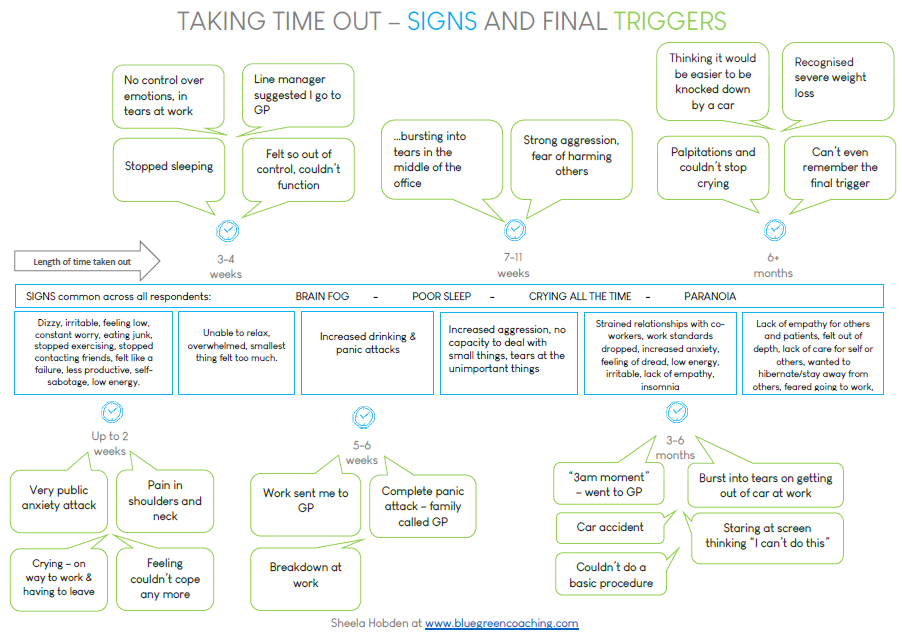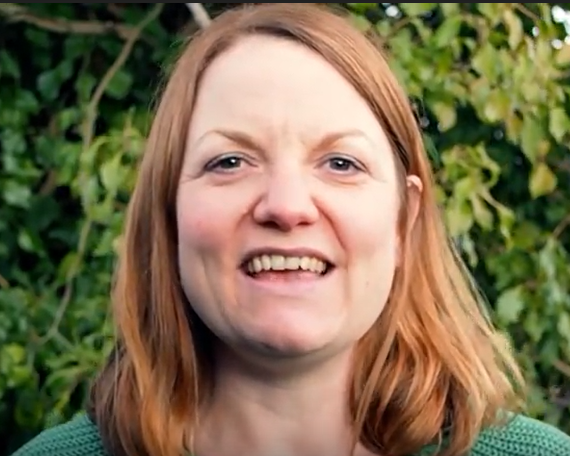
My guess is that you’re here because either;
a) you know deep down you need time out and, you’re seeking external evidence to justify it or;
b) you’re experiencing some really uncomfortable emotions. Although, you can still just about do your job, function day to day, you are looking for answers on “how bad” things have to be, before taking action or;
c) maybe it’s a combination of the above.
First off, what gives me the credibility to be writing about this? I stopped, stepped back and got help. I am here to tell the tale. In a sense, I’ve been there, done it, worn the t-shirt. Its now “framed”.
It was actually pivotal in changing the way I live my life. I am proud I did something about it, and now spend a chunk of my life supporting others to look after themselves so that time out is either prevented, minimised or, doesn’t take as long to heal as I did!
For chunks of time, I felt trapped. It was what I can only describe as a pulsing blender of confusion!
The dilemma was that I didn’t feel “bad enough” to take time out.
Thinking back however, I don’t know how bad I thought I needed to be, to justify it. After all, waking in the morning with a pounding chest, crying every day before and during work (I knew the ladies’ cubicles far too intimately!) doesn’t really seem like normality. I kept telling myself that I wasn’t “that bad” though. My mission since stopping to take time out for myself to heal has been to help other people get the space and support they need sooner, so they don’t get hit as hard.
The question has always sat with me though…

At what point is it right, to take time out?
How do you decide?
If you know that if you don’t take time, things really will get out of control, the result could be that it might not be you making the decision any more. Maybe that is what suits some people better though, to have the decision made for them?
I recognise that everyone will have a different context, however I feel that, the part that is really, really hard to determine, is the right point to say “I need time out”. As I mentioned, I experienced a sense that I wasn’t “bad enough” to need time off, despite a feeling of dread every morning, crying in the shower, struggling to hold back tears at work and feeling like I’d lost control of myself. Even with all of that, I was somehow managing to go about my day to day, get my job done. I will add however, that I was exhausted at the end of every day, not wanting to see anyone, do anything or go anywhere. No-one really noticed anything was wrong, so why would anyone believe I needed any sort of break?
As I set out to write this, I wanted to check if it was just me, or if other people felt similar about this, so canvassed opinions and experiences of others in my network, and of course, found parallel stories.
So, it goes a little something like this. It feels like there are “two of you”. A big confident part of you is saying keep going, and is trampling all over the quieter voice, gently suggesting that you need to take time out.
The big “others perceptions” voice keeps winning the “argument” though…
- That’s weak, you’re a failure
- You’ll be letting everybody down
- You’ll be “leaving them in the lurch”
- It’ll go against you
- You’ll be labelled as having Mental Health “issues”
- If you stop you won’t ever go back
- You’ll lose credibility and status
And so, you “soldier on”. The voice returns. You know your GP would sign you off if you went but…
- What exactly would I say is wrong?
- How long would I be signed off for?
- How long would I actually need?
- What would they write on the note?
- Would it go on my record?
- How would I tell work?
- Will I ever get better?
The “conversation” continues…
- You’re drinking too much and eating junk but its OK, it helps you through
- You’ve stopped connecting with people, but that’s OK because you’re just busy
- You’re just tired, you cry when you’re tired
- The lack of sleep is annoying, but you can manage on a little less sleep…
- It’s only a headache, sometimes stomach ache, I’m a bit snappy, its not “THAT” bad…
The worries niggle on, keeping you crawling along…
- The workload will be even worse when I go back
- What would I say to people?
- What would people think of me…they’ll think I’m weak, a failure
- It would mark the end of my career…how will I get a job in future?
- What if I lost my job, how would I cope financially?
Until the day you find…
- You’re drinking way too much and eating mostly junk
- You’ve stopped connecting with people
- You’re crying every day, for most of the day
- You’re paralysed with paranoia
- You’re so tired you can’t do basic tasks
- You’ve totally lost empathy for patients and co-workers
- You’ve shouted and sworn at your boss/patient/client
- You break down at work
- You can’t physically get out of bed
- You are in a hospital bed
- You’re thinking it would be easier to get knocked down by a car than go to work
From the people I spoke to, the below graphic shows the symptoms they were experiencing, the final trigger that meant they took time out, along with the time they were out for.
One sign that came up for almost everyone was being tearful and crying, without being able to control it. That was closely followed by lack of sleep or insomnia.
Sleep is SO critical to our well-being (I’d go as far as survival), that it’s not surprising it’s a feature of needing time out. Its another topic for discussion on what comes first e.g. is it a lack of sleep that causes the mental health issue, or the mental health issue that causes the lack of sleep. Possibly a combination – but definitely too much to explore further here (check out an article I wrote on Sleep after reading Matthew Walkers “Why We Sleep” for more and some NHS resources here).

A question I asked the participants of my survey was “do you wish you’d taken time out sooner?” and the answer was YES, to the tune of 85% of people I asked.
What is actually going on though? Why do I feel so bad?
From the training, reading and research I have gathered over the years since suffering myself, I believe there are a few potential roots. One is that we may have lost connection with something or maybe never had it in the first place, and/or, our resources to deal with the lack of it, or having to handle life without it depletes us further of those resources. There are too many areas to list here in this article, but you can read more about some of them in this article.

A note on burn out
A few facts about burn out – it’s not you, its them! The Gallup survey said the top reasons for burnout are unfair treatment at work, unmanageable workload, lack of role clarity, lack of communication and support from their manager and unreasonable time pressure. So, actually if you are experiencing any of the thoughts described in this article and you can link it to any of these, you’d do right to do what you can to address these challenges.
For more on burnout, check these useful links: Maslach Burnout Inventory and article on “Workplace not people”
So, how bad does it need to be?
Now that you have seen some of the things other people experienced ahead of taking time out, what are you thinking about what you need right now?
Here are a few questions for consideration:
- Do you sense that if you don’t do something now, something very bad is likely to happen?
- How “bad” do you need to be? How much longer can you survive like this?
- What happens if you do nothing? What impact will that have on your body? Those around you?
- If someone you know, or in your team was experiencing the same things as you, what would you be suggesting?
- What is your worst fear about taking time out? If that happens, what would you do [yes this is difficult to think about, but it will at least face the fear head on]?
- How many people are worried about you right now?
- Who has already tried to help you or suggest something?
- Are you afraid to speak about your feelings for fear of breaking?
The answers to these questions will help you to build a picture of what is happening for you right now, and what might happen, depending on what you decide to do.
I remember thinking things like “I’ll take time when this project is done…” or, “I’ll be OK after my holiday” but now can see that there really never will be a “right time” to take time out, there will be what is “right for you”. So, if you draw the conclusion that you need to preserve your resources, or that if you keep on placing demands on them that they will get depleted, then it is time to take preventative action and give yourself the space you need. It is a very hard decision, however it is something you are in control of, and actually that recognition alone will be the start of your recovery process, because our sense of control is an important element of resilience, which impacts our well-being. So, to be clear, there is a choice, only YOU can make it, though it is for your future self.
The longer you leave it, the harder it will be to think clearly about what you need, and as you have seen from my research, other people start suggesting the decision for you!
If you are still unsure and need to think a bit deeper, then download my free kit to help you reach that decision.
Where my thinking originates from:
As I’ve grown the body of research on well-being, a couple of resources have become the corner stones. They are Johan Haris’ Lost Connections and Griffin and Tyrells’ Human Givens (Emotional Needs), then the practical training coming from the Wraw tool, that I am a practitioner for. All of these key works are integrated in my MOT4U concept and are integral to many of my one to one and group programmes.
💡 There are a couple of things I can offer at this point:
- Time Out Kit – use it to do some thinking on whether this is what is needed
- Take a read of “a vehicle for well-being” and consider taking your own MOT4U right now!
- Wraw Report & Coaching – an in depth psychometric measure of your resilience and impact on well-being
How did this land with you?
I really would like to hear, so do get in touch and share your experience or comment.
This article forms part of the Mental Health Time Out series:

Sheela Hobden is a Coach at bluegreen Coaching. Following her own mental health battles, she now coaches individuals, runs training sessions and speaks at conferences. She has a real passion for helping medics and healthcare professionals take as much care of themselves as they do their patients in whatever life or career conundrums they face! She is also a Mentor Coach and Coach Supervisor. She has a PGCERT in Business and Personal Coaching, holds PCC member status with the ICF and is CIPD qualified. She challenges herself with ultra distance running and Ironman. Find her at www.bluegreencoaching.com or swimming in the sea, in Poole, Dorset
Get more ideas and tips by joining her newsletter tribe – sign up below!
Better still, book in to speak with her directly?

